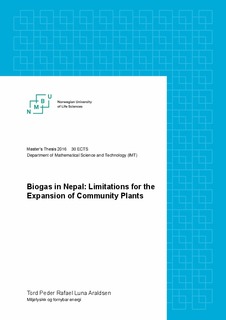Biogas in Nepal : limitations for the expansion of community plants
Master thesis

View/
Date
2016-11-22Metadata
Show full item recordCollections
- Master's theses (RealTek) [1722]
Abstract
A large amount of the world population still rely on the use of solid biomass for cooking. The implementation of the biogas support program (BSP) in 1992 has successfully contributed to the popularization of biogas in Nepal and helped reduce the dependency on traditional fuels by introducing a sustainable alternative. Even though the extended use of biogas has had a positive impact on the environment and health of thousands of Nepalese families, the technology has yet to benefit the poorest portion of the population due to the relatively high construction costs. Promoting the use of community biogas plants over private household digesters can reduce the economic cost per volume of gas produced and opens the opportunity to run commercial applications, making the biogas plant a potential source of income. However, based on paper reviews and an inspection of two community plants in the Southern region of Nepal, there seems to be a strong tendency for community plants to fail. This failure is often related to social conflict that arises within the community and results in mismanagement and in many cases the abandonment of the plant. The GGC biogas plant design that is standardized in Nepal is used for both single household and community plants, but is not properly optimized for community use. Modifying the plant design to ease cooperation and management i.e. by separating the gas storage for each household within the community, could help mitigate social conflict. More research and development in this regard is necessary to determine the present state and functionality of existing community plants, and to create a more appropriate design for community biogas in Nepal.
